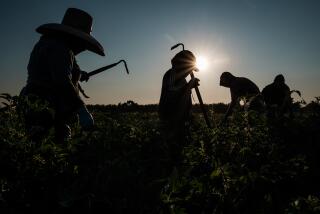A real heat shield for farmworkers
- Share via
Government spreadsheets tell their stories:
“Found dead under grapevine; had been missing for approximately 15 hours.”
“Found dead in a melon field.”
“Died after driving all day on a tractor in 111 degrees F.”
Dozens of farmworkers have died from heatstroke in the last decade in California. No one knows exactly how many because sometimes their deaths are not recorded as heat-related or not recorded at all. Maria Isabel Vasquez Jimenez is one whose story we do know.
Summer hadn’t officially begun when Vasquez collapsed May 14 while pruning grapevines near Stockton. She died from heat illness two days later. The 17-year-old’s core body temperature had exceeded 108 degrees Fahrenheit after working 9 1/2 hours in 95-degree heat with only limited access to drinking water and no shade.
Two years earlier, the state Division of Occupational Safety and Health had cited Vasquez’s employer, Merced Farm Labor, for violations including not having adequate drinking water. But Cal/OSHA never followed up on the citation, and the employer never corrected the situation. Last week, the state fined the company a record $262,700 for violating workplace safety requirements in the Vasquez case.
Workers’ compensation statistics show that farmworkers suffer from heat illness in higher numbers than any other occupational group except firefighters. But unlike farmworkers, few firefighters die of heatstroke. Perhaps it’s the greater access to drinking water and rest breaks that save the lives of firefighters. Perhaps it’s better emergency preparedness and access to first aid. Or maybe it has to do with the value that society places on the lives of people who fight fires as opposed to the lives of those who harvest the nation’s food.
One thing is certain: Vasquez did not have to die.
By law, California employers must provide farmworkers with adequate drinking water and training on heat illness. Employers must have a shade structure and allow workers to take an extra rest break of no less than five minutes in the shade if they feel ill or need relief from the heat. But Vasquez’s death shows the woeful inadequacy of the heat-illness prevention regulation and its implementation.
Studies prove that farmworkers would greatly benefit from having all rest- and meal-period breaks in the shade, yet few employers provide for that, and the regulations do not clearly require it.
In addition, during very hot weather, more rest breaks should be mandatory. Under current regulations, the burden is on an ill farmworker to seek an additional rest break as provided by law.
Risks to farmworker health and safety are not just heat-related. Every year, transportation and heavy-machinery accidents cost the lives of farmworkers. And then there are the pesticides. Some, such as sulfur, frequently cause skin, eye and respiratory irritation. Others, such as methyl bromide, chlorpyrifos and diazinon can cause chronic illness, including cancer.
Just as with heat illness, the safety regulations covering these risks are weak. Rule-making bodies within Cal/OSHA and the Department of Pesticide Regulation are heavily influenced by growers and employers. As a result, health and safety rules such as the heat-illness regulation are watered-down versions of the original proposals and take years to put into place.
Even after a regulation is in place, there is little oversight of what goes on in agricultural fields. Our agency, California Rural Legal Assistance Inc., found that Cal/OSHA inspected relatively few agricultural employers for violations of the heat-illness prevention regulation last year, although since Vasquez’s death, reports show a marked increase in inspections.
And, finally, when employers are cited and fined for violations, those fines are often reduced on appeal or in other negotiations. At other times, the fine is rendered meaningless because the employer never pays it.
California must put money and effort into aggressive enforcement of strong regulations intended to protect farmworkers. Otherwise, the state sanctions the conditions that caused Vasquez’s death. Consumers, too, must insist that the farmworkers who cultivate and harvest our food are not in danger of dying in the process.
It’s ironic that November’s ballot will carry an initiative to ensure that chickens are humanely treated on California farms, while weak regulations fail to protect farmworkers from heat illness and other risks. The workers who provide us with our daily meals deserve better.
More to Read
Sign up for Essential California
The most important California stories and recommendations in your inbox every morning.
You may occasionally receive promotional content from the Los Angeles Times.










